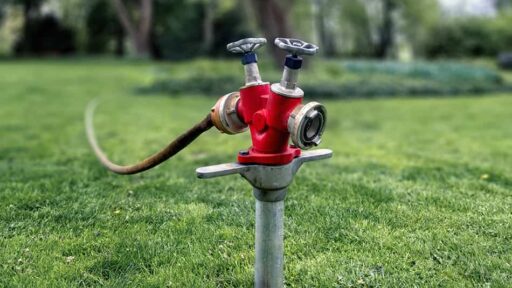We all want a lovely, welcoming summer garden that greets us bright and green when we step foot outside. However, for some of us, it might feel like a lot more work than it’s worth. Alas, you can’t ignore your garden if you don’t want an overgrown mess, but you can make sure that you’re working smarter rather than harder. Here, we’re going to look at a host of ways you can make your garden a little easier to take care of.
Get Sprinking
First and foremost, if you’re spending a portion of your late afternoon out there, hose in hand, making sure that your thirsty lawn gets its fill, then you could most definitely benefit from an automated sprinkler system. Timed irrigation means no dragging hoses or remembering to water during dry spells. Drip systems are ideal for garden beds, minimizing water waste while nourishing plants at the roots.
If you have meticulously crafted garden zones, a lot of lawn sprinklers can be adjusted to operate differently in specific areas and times. Smart sprinklers are even able to respond to changes in the weather, skipping the sprinkle when it’s already raining or being a little more frequent during those overly dry, sunny days. Aside from making it a lot easier to hydrate your garden, it saves water and money, too.
Find Your Reliable Plants
One way that a lot of beginner gardeners add significantly to their workload is by choosing plants that are a lot more sensitive to their climates. The best low-maintenance plants tend to be those native to the climate, as they (alongside perennials) don’t need as much water, fertilizer, or care.
Drought-tolerant plants like lavender, yarrow, and ornamental grasses are also a great option. If you’re looking to spend less time on your hands and knees weeding, then evergreen shrubs and ground covers like creeping thyme can help you manage a cleaner garden.
Avoid high-maintenance flowers that demand deadheading, frequent feeding, or pest control, and be sure to group plants by their water and sunlight needs, so it’s easier to care for them all together.
Is It Time To Upgrade Your Tools?
If you’re trying to take care of your garden with old and inefficient equipment, then it’s only natural that it’s going to be more work than it should be. For instance, updating to one of the more powerful lawn mowers is going to make cutting your grass significantly easier.
When it comes to handheld tools, such as hedge trimmers, blowers, and edgers, opting for cordless versions can make them quieter, lighter, and much easier to handle in all kinds of positions, aside from being more environmentally friendly than gas-powered types. Even simple upgrades, like ergonomic handles or sharp replacement blades, make a big difference in comfort and efficiency.
Quality tools that are easy to use and store can reduce fatigue and speed up your work, making garden maintenance far more manageable.

Make Mulch Your Ally
If you’re sick of having to water your plants as much or dealing with the constant onslaught of weeds, then a thick layer of mulch could be just the thing that you need. You can find organic mulches like bark, wood chips, or composted leaves that retain soil moisture, regulate temperature, and suppress weed growth.
Less sunlight reaching the soil means fewer weeds to pull, and the mulch breaks down over time to enrich the soil. Garden beds work best with roughly 2 to 3 inches of mulch, and it even protects plant roots during extreme weather. You have to do it just once a season, and it means you spend much less time on upkeep throughout the year.
Define Your Garden
While it might seem like letting your garden grow relatively freely would give you less work, it actually means the exact opposite. Adding some structure to your outdoor space with raised beds and clean borders means a lot less time spent on maintenance. For one, raised beds keep weeds out, improve drainage, and make planting and harvesting easier on your back.
They also warm faster in spring and can be customized with ideal soil mixes, reducing the need to constantly improve them with feed and other products. Defined borders made from stone, metal edging, or composite materials help keep grass and invasive plants from creeping into flowerbeds.
Should You Replace Your Lawn?
One of the easiest ways to reduce how much maintenance your lawn requires is to simply get rid of it. While this might seem like a drastic option for some, ground covers are becoming more and more popular as people get sick of mowing, feeding, and watering their lawn.
Alternatives like clover and creeping thyme are weed-resistant, support pollinators, and are much easier to grow, especially in shady areas. Of course, there are other ways to reduce your natural lawn space, as well, such as patios, decking, and artificial grass. While the upfront cost of some of these alternatives can be pretty high, you can save a lot of money on taking care of a lawn, especially a temperamental one.
Make A Routine
One of the biggest issues that somewhat more reluctant gardeners have is that it seems like you have to spend hours out there, tidying it up. However, that’s often only true because some people tend to let their garden grow unchecked for too long, do it all in one big go, then leave it alone for weeks again.
Making a weekly schedule that sees you watering, mowing, edging, and otherwise caring for the garden on a daily basis can see you out there for just a few minutes every day, rather than having to take on a seemingly mammoth task once every two weeks or so. Routine maintenance can mean a lot less work.
If maintaining your garden is becoming more and more work, then you should take a step back and ask yourself why that’s the case. The right tools and shortcuts can help you give it the care it needs without having to spend all day out there.








![20 front yard succulent garden ideas[P]](https://cdn.enthrallinggumption.com/wp-content/uploads/2023/12/20frontyardsucculentgardenideas-512x288.jpg)